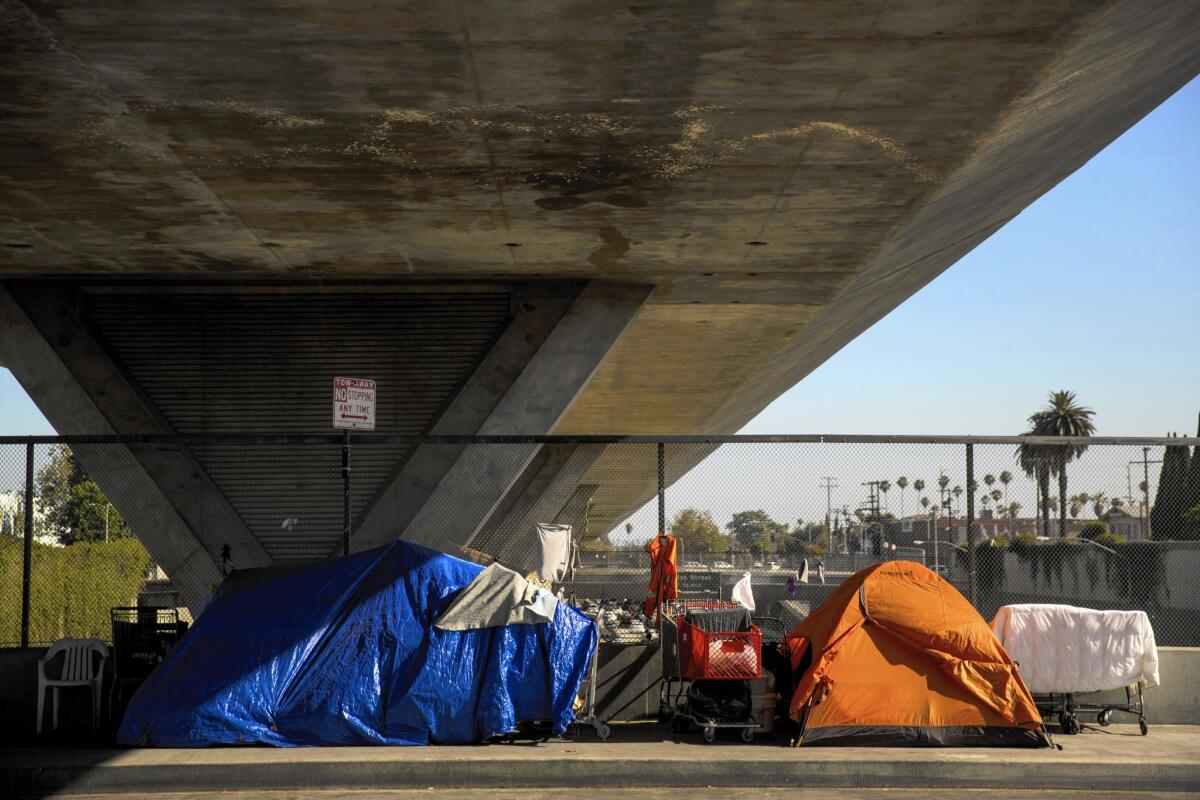As L.A.’s homeless crisis worsens, no one is in charge. That has to change

- Share via
I could give you a hundred reasons homelessness has become L.A. County’s most vexing challenge, from the gargantuan income gap to housing costs to the scourge of drugs and mental illness, but the biggest impediment to solving it may be this:
Nobody is in charge.
For the record:
9:24 a.m. Nov. 20, 2019An earlier version of this story incorrectly referred to the Los Angeles Business Council Institute as the Los Angeles Business Institute Council.
I didn’t need to research and write a three-part series on homelessness in Hollywood to know that, but my experience over the last few weeks sealed the deal, raising lots of questions about strategy and leadership.
It’s not that there aren’t well-intentioned leaders focused on the problem. Mayor Eric Garcetti, and Supervisor Mark Ridley-Thomas, to name just two, are deeply involved in trying to find solutions. And behind the scenes, lots of dedicated people at multiple agencies are doing noble service every day, strategizing, coordinating and delivering services that have helped thousands of people.
But encampments continue to multiply despite the hundreds of millions of dollars spent on housing and services, tension is rising between those favoring sweeps and those screaming for more services, and there is no single person or government authority to answer for any of it.
If this doesn’t change, we’re doomed. But there’s a glimmer of hope for a new direction.
Sarah Dusseault, chair of the Los Angeles Homeless Services Authority commission, told me Tuesday that she wants to explore the possibility of blowing up the current system and designing one in which it’s clear who’s in charge. LAHSA, created in 1993 to coordinate city and county services, has a lot of responsibility and distributes a ton of money for services, but it has no authority to design or implement a comprehensive strategy. So we’re left with a battalion of 88 cities and their attendant bureaucracies, along with a huge county presence, but no command center or field marshal.
“There are times where it’s very unclear who is the lead, and when there’s no clarity around that or the goals, we are not going to be successful,” said Dusseault, who was appointed this past summer.
That comment reminded me of my attempt to get some simple stats on a temporary shelter in Hollywood with funding from various government sources. I got numbers from a council office but wanted to verify them with a mayoral staffer who referred me to LAHSA, which suggested I call the nonprofit running the shelter, which resulted in a call to me from a PR person who didn’t have the answers. I later got the numbers from a LAHSA spokesman who got them from the mayor’s office, and by the way, the numbers weren’t too impressive.
Four people had been placed in permanent housing in eight months, and there is no one in city or county government who is accountable for that. The system, such as it is, is the perfect way for public officials to duck or point fingers. And as Dusseault says, we have to have accountability.
They came to Hollywood from Ohio, Tennessee, Idaho, Oregon, and ended up on the streets. One thing they have in common: past trauma.
“We have to look at these expansive flow charts and figure out how we can eliminate steps and become more efficient,” said Dusseault, who said that among other things, she’d like to see a better strategy for keeping low-income and senior residents from losing their housing.
Dusseault said she and the LAHSA commission will spell out plans at next month’s meeting to form an exploratory committee that looks into the possible restructuring of LAHSA along the lines of L.A. County’s Metropolitan Transportation Authority, which has a Chief Executive Officer and a staff overseen by a board made up of elected officials from around the county who have control over how money is spent and responsibility for formulating a coherent strategy. Another option might be for LAHSA to hand more authority to cities or regions, some of which are already peeling off and doing things their own way.
This isn’t the first time these ideas have been floated. I had a conversation with Garcetti and Ridley-Thomas nearly two years ago in which they teased the idea of using a Metro model for LAHSA. But nothing came of that, and now, as the crisis mounts, there’s a clamor for new tactics.
Not only is nobody in charge, but nobody is explaining what happens now that a billion dollars in Measure HHH funding has been largely spent on housing that will serve only several thousand people in a county with a homeless population of nearly 60,000.
“Despite the huge investment we’ve made, the endgame is not clear,” said Miguel Santana, who worked on homelessness as both a city and county employee, and who served on the oversight committee that kept watch on the billion dollars approved by voters for housing.
In that latter role, Santana said, he was frustrated by both the time it took to build the housing (more than two years) and the cost (more than $500,000 per unit), and advocated for strategies that were more creative and less costly and time consuming.
“Angelenos are frustrated and becoming increasingly hostile,” Santana said earlier this month when receiving a public service award from a nonprofit called Project Restore.
“Their outrage is legitimate and they are rightful to ask: Why is it so difficult and expensive to house people? What is the endgame? Who is in charge? As L.A.’s civic leadership, we should not be afraid to admit that we have failed.”
A former marine is now a cop, walking the streets of Hollywood on the homelessness beat. She sees a flawed strategy, haphazard execution and discouraging results.
The assessment by voters is no better. Polling for the L.A. Times and the Los Angeles Business Council Institute found that 95% of voters called homelessness a serious or very serious problem, and a staggering two-thirds said money is being spent ineffectively and that police should play a bigger role.
If LAHSA were restructured and given full authority and responsibility — and the commission were made up of elected officials from throughout the county — they’d be on the spot to draft strategies and set goals and be held responsible if they don’t deliver. We’d still have turf wars, political and geographic, as well as legitimate differences of opinion. But at least a public agency could be held accountable, and the public could participate.
Given the raging drug problem among homeless people, is there any good reason we’re not treating it like the epidemic that it is?
If a Democrat doesn’t win the White House next year, and federal funding for housing and services remains skimpy, what’s the local plan for building more housing?
If we house 10,000 homeless people, or even 30,000, but tens of thousands of people remain on the streets and more keep coming, what then?
You can’t start arresting people for being homeless if there’s nowhere for them to live. But are creative compromises possible in which the rights of residents and the homeless people are addressed simultaneously, perhaps by appropriating underutilized public facilities?
Should local officials get behind the call by Sacramento Mayor Darrell Steinberg and Supervisor Ridley-Thomas to build at least a temporary roof over everyone’s head, with the goal of getting them started on permanent recovery, and then make it illegal to live on the street?
If so, what do you do about those who refuse to move indoors? Do you support the movement to redefine what constitutes grave disability, and forcibly treat those with physical or mental illness who are withering away?
The answers won’t be easy to come by, but thus far, we’re not even asking the questions.
And the reason is clear.
Nobody is in charge.
steve.lopez@latimes.com
More to Read
Sign up for Essential California
The most important California stories and recommendations in your inbox every morning.
You may occasionally receive promotional content from the Los Angeles Times.
















